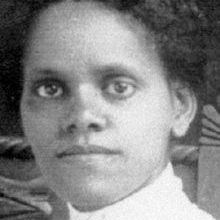To a Brown Boy
’Tis a noble gift to be brown, all brown,
Like the strongest things that make up this earth,
Like the mountains grave and grand,
Even like the very land,
Even like the trunks of trees—
Even oaks, to be like these!
God builds His strength in bronze.
To be brown like thrush and lark!
Like the subtle wren so dark!
Nay, the king of beasts wears brown;
Eagles are of this same hue.
I thank God, then, I am brown.
Brown has mighty things to do.
Published:
1922
Length:
Shorty
Literary Movements:
Harlem Renaissance
Anthology Years:
2022
Themes:
Identity
Intersectionality & Culture
Joy & Praise
Literary Devices:
Anaphora
a figure of speech in which words repeat at the beginning of successive clauses, phrases, or sentences
Metaphor
a comparison between two unrelated things through a shared characteristic
Personification
the attribution of human qualities to a non-human thing
Simile
a comparison between two unlike things using the words “like” or “as”

